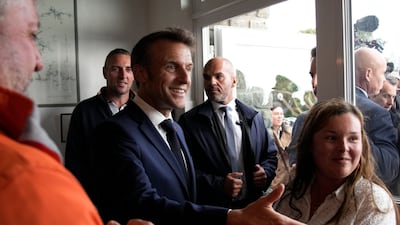French President Emmanuel Macron on Wednesday appeared further weakened by an EU reprimand over his country's excessive deficit ahead of a snap election that shows his political group trailing behind the far-right and a leftist coalition.
In total, seven EU countries, including France and Italy, face censure by the EU Commission for running budget shortfalls above the bloc’s 3 per cent limit, leaving them subject to procedures that requires remedial action and can lead to fines for non-compliance.
European officials attempted to downplay the importance of the announcement for France, but it could not come at a worse moment for Mr Macron.
The French leader has been trying to portray his camp as a safe choice over his opponents' proposals that include massive tax cuts and civil servant salary increases.
Last month he called snap elections on June 30 and July 7 after the far-right's historic victory in a European election.
"We all know that what we present today, which is a first step of a decision that will be taken in the coming weeks, was largely expected, so it doesn't come as a surprise," Economy Commissioner Paolo Gentiloni told reporters at a press conference in Brussels.
"In the same package, we also state the fact that France is no longer experiencing imbalances, which is also a message of reassurance," added Mr Gentiloni.
The EU Commission, the bloc's executive arm, can now put forward the possibility of opening disciplinary procedures at a meeting of finance ministers next month.
European parliament elections - in pictures
Mr Macron has called on voters to "say no to extremes". His Finance Minister, Bruno Le Maire, has warned that France risks a scenario similar to the UK in 2022 under Liz Truss's 49 days as premier when she caused mayhem on the financial markets.
There was financial turmoil after Mr Macron's decision on June 9 to dissolve parliament. French borrowing costs rose and last week the Paris stock exchange fell by 6 per cent, which had not happened since Russia’s 2022 invasion of Ukraine.
Government officials have strived to portray this as a consequence of the announcement of their opponents' programmes, which Mr Le Maire has described as "economic and financial folly" that could trigger a debt crisis.
But many accuse Mr Macron of causing such turmoil in the first place with his decision to call for snap elections - a shock move that has only happened five times in France since 1958.
The public seems unconvinced by his arguments, with recent polls showing the president's centrist camp trailing in third place with 18 per cent of the votes, far behind the far-right National Rally (33 per cent) and a left-wing coalition named the New Popular Front (28 per cent).
Mr Macron, who has been in power since 2017, is perceived as having failed to strengthen French public finances.
Last year the public deficit reached 5.5 per cent of GDP and the public debt 110.6 per cent of GDP, way over EU targets of 3 per cent for the deficit and 60 per cent for debt.
The EU has disregarded official targets in the past when they were viewed as inconvenient, especially for large economies such as France or Germany.
Government officials have been reported to express bitterness at a perceived lack of gratitude from the French public after massive public spending protected households from a spike in energy prices after Russia's 2022 invasion of Ukraine. Prices soared in some EU countries such as neighbouring Belgium.
“No matter how much we remember all the money spent because of Covid and the war in Ukraine, it’s no use, because people are ungrateful," an adviser to Mr Le Maire was quoted as saying on Wednesday by radio France Inter.
Mr Gentiloni also pushed back against the idea that economic austerity increases the popularity of hardline political parties.
"Extremes in a certain sense were not weak in the past election after a period of very high expenditure," he said. "The theory is not completely true in my view."













